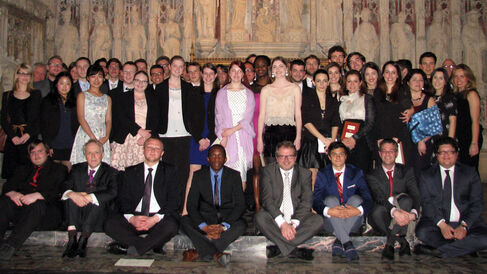Seventh IRLM (2014)


The International Roman Law Moot Court Competition returned to Oxford for its seventh instalment, from 5 to 8 April 2014. The opening sentences of the libellus owed a little to René Goscinny, albeit with a twist: ‘It is AD 540. The west of Europe has been overrun by barbarian tribes, who have set up their own independent kingdoms but, in the middle of southern Britannia (as it used to be known), in what the locals call The Great Weald, close to the Celtic hamlet of Siúlóid damh trí uisce (later, after the West Saxon expansion, called Oxanforda), a small group of Romans resist.’ To these lofty literary allusions was added an archaeological inspiration in the silver Graeco-Roman kantharos (drinking cup) of Stevensweert, found near the River Meuse in 1939 and subsequently the subject of legal proceedings that reached the Supreme Court of the Netherlands.
In the IRLM narrative, the Britannic Roman Alfredus, having come across the cup ‘in a visit with the troops’ to the nearby Celtic settlement, sends it to his friend Bartolus to sell and, from the proceeds, purchase a good copy of Justinian’s codification, together with four casks of good Opimian wine for the oppidulum Romanum’s celebration of the Emperor’s reconquest of Italy. Having initially obtained parchment copies of the Institutes, Digest and Code, Bartolus exchanges the Digest for a papyrus copy in a deal sweetened by five solidi. His slaves take a sip or two of the Opimian wine before it reaches Britannia and one of the other casks turns out to have gone sour. Meanwhile, a certain Ferox recognises the cup from its inscription to his uncle (a senator and officer in the legions who died when the Goths captured Milan) and claims it as heir to his uncle’s estate. Issues of mandate, unjust enrichment, theft and duties of good faith were thus intertwined in the overlapping claims that the parties submitted for adjudication.
| Libellus | Ferox c. Barolum; Ferox c. Galvanum |
| Palma Victoriae | Universität Wien |
| Palma Secunda | National and Kapodistrian University of Athens |
| Palma Tertia | Eberhard Karls Universität Tübingen |
| Palma Optimi Oratoris sive Clifford Chance LLP Best Oralist Award | Georgia-Ilianna Karamani (National and Kapodistrian University of Athens) |
| Mentiones Honorifices | Josefine Wolff (Eberhard Karls Universität Tübingen); Rory Gregson (University of Cambridge) |
